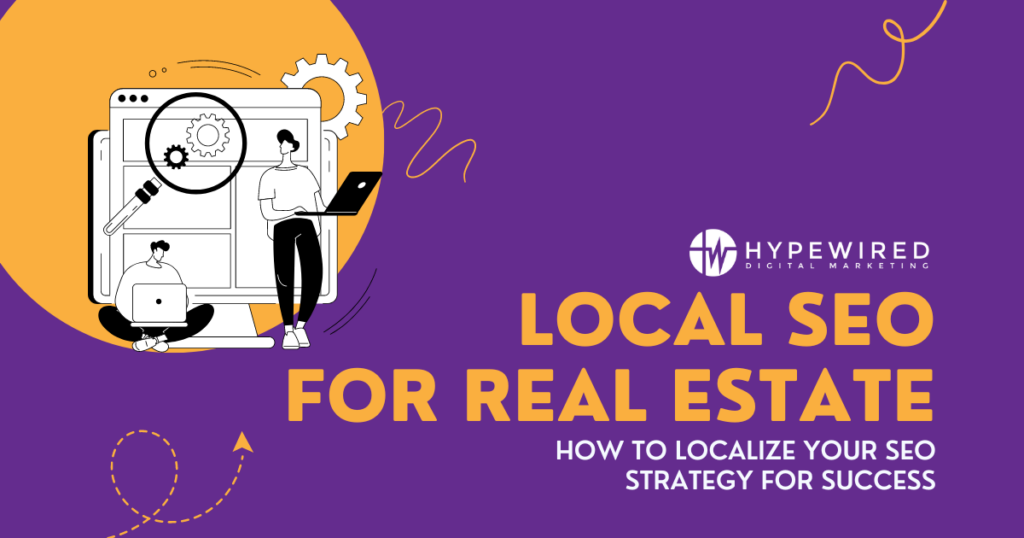Local SEO can be your ticket to success if you’re a real estate agent aiming to gain an edge. By understanding how local SEO works and implementing the appropriate strategies, you’ll soon see improved rankings in search engine results pages (SERPs). Let’s explore the fundamentals of local SEO for real estate agents so you can make informed decisions about how best to promote yourself online.
Understanding Local SEO for Real Estate Agents
Real estate agents looking to boost their visibility and attract leads should use local SEO, which involves optimizing web content and other online assets to rank higher in local SERPs. By targeting specific keywords related to your location, you can ensure potential customers find you when searching for a real estate agent in your shared area.
Local SEO focuses on keyword research related to the particular city or region where you operate and creating content tailored to those areas. With these effective optimization techniques, it’s possible to target these searches more precisely than ever, meaning more qualified leads are coming through your door. Additionally, using local directories such as Google Business Profile and Yelp makes it easy to establish yourself as an authority figure within the community, which will only further enhance your reputation among potential clients.
Optimizing Your Website For Local SEO
Real estate agents must employ strategic keywords and content to maximize the effectiveness of local SEO to achieve their desired audience and increase lead generation.
Keyword Research & Targeting
Keywords are essential for local SEO success. Agents should research relevant terms that potential clients might use when searching for properties in their area. They should also consider using location-specific words such as “homes in [city name]” or “real estate listings in [state].” By targeting these specific keywords, agents can ensure they appear higher on SERPs.
Creating Quality Content
Once agents have identified their target keywords, they should create quality content around those topics. Blog posts about recent developments in the local market or helpful advice for buyers and sellers are relevant topics. Ensure all content contains the targeted keywords so search engines can index the pages correctly. Additionally, including visuals like photos or videos will make your website more engaging for visitors.
Optimizing Your Site Structure & URLs
Another essential aspect that will contribute to your local SEO efforts is ensuring your site’s structure is easy to navigate by humans and search engine bots alike. This involves checking all pages are linked correctly so users don’t get lost while browsing your site and creating descriptive page titles with relevant keyword phrases included whenever possible. To ensure better ranking, aim for shorter, targeted URLs.
Building Links to Improve Your Local SEO Rankings
Building links from other websites back to yours is another critical part of successful local SEO strategies. This method helps boost visibility on SERPs while driving traffic directly from external sources. Agents should focus on claiming online business listings where appropriate, guest posting on relevant blogs/websites related to real estate within their area, and leveraging social media platforms like Twitter and Facebook, which often feature geo-targeted ads. These tactics help build credibility with search engines, improving rankings over time.
Claiming and optimizing online business listings is integral to local SEO for real estate agents. You can help your business appear in local search results by claiming listings on sites like Google Business Profile. Ensuring the correctness of all data connected to these listings—like address, phone number, website URL, and opening times—and optimizing them with pertinent keywords is crucial. This will help potential customers find you more easily when searching online.
Guest posting on relevant sites is another effective way to build links and improve your local SEO rankings. Look for websites related to real estate or other topics related to your area of expertise and offer content contributions in exchange for a link to your website or blog post. Your content should add value to their site so it’s worth linking to. This could be anything from a helpful how-to guide or an article about current trends in the industry.
Finally, leveraging social media platforms can also help boost visibility and attract leads through organic search engine traffic and direct visits from followers who may be interested in what you have to offer. Share high-quality images and informative captions across channels regularly, including hashtags specific to your location, so viewers know where you’re located when searching for properties.
Tracking & Analyzing Your Results
Tracking and analyzing the results of local SEO efforts is essential for real estate agents looking to generate leads. Setting up goals in Google Analytics can help track progress towards specific objectives, such as increasing organic search traffic or conversions from organic search. Agents can use this data to identify areas needing improvement and optimize strategies accordingly.
Monitoring search engine rankings with tools like SEMrush or Ahrefs is also essential for understanding how your website performs against competitors. These tools provide insight into which keywords are targeted by competing sites, allowing you to adjust your strategy accordingly.
Analyzing traffic sources is key for identifying opportunities to improve local SEO performance. Knowing where visitors are coming from (organic search, social media, etc.) allows agents to tailor their content and campaigns to drive more qualified leads from each source. For example, suppose most of your traffic comes from organic searches related to a certain keyword phrase. In that case, you should create content around that topic and target those keywords specifically when optimizing pages on your website.
FAQs About Local SEO for Real Estate
What is local SEO?
Local SEO optimizes a website to be more visible in search engine results. This strategy requires creating content centered on particular geographic locations and verifying that local business listings are accurate and current. Local SEO helps businesses target potential customers searching for services or products within their vicinity, thus increasing leads and conversions.
Why do real estate agents need local SEO?
By leveraging localized keywords and geo-targeted ads, real estate agents can ensure they’re reaching the right people at the right time with relevant information about their listings and services.
Start Using Local SEO Strategies Today
Real estate agents must understand the key role local SEO plays in the success of their business. Monitoring and refining their local SEO strategy can give agents an edge over their competitors and ensure potential clients learn about what’s available in their area.

 February 8, 2023
February 8, 2023




